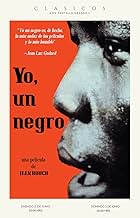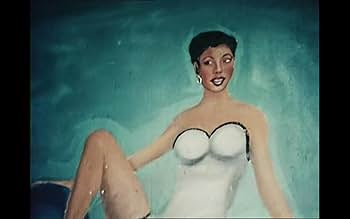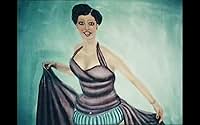VALUTAZIONE IMDb
7,3/10
1160
LA TUA VALUTAZIONE
Aggiungi una trama nella tua linguaA life of Nigerien immigrants in Abidjan, Ivory Coast within a week.A life of Nigerien immigrants in Abidjan, Ivory Coast within a week.A life of Nigerien immigrants in Abidjan, Ivory Coast within a week.
- Regia
- Sceneggiatura
- Star
- Premi
- 2 vittorie totali
Recensioni in evidenza
I was lent this film on video and was told that it was 'the first film of the French new wave', which is interesting because it's actually set in the ivory coast. It compensates its amateurish look and dubious acting through a very enjoyable and often amusing script and a relaxed yet intimate style. Revealing and engaging.
Whatever the interest today in the lives of several menial workers in the late 1950s Ivory Coast or the background described of their city Abidjan, the abiding significance of director Rouch,s project in this and several other documentaries about Africa is the way he offered his subjects a full participation in the way they would be filmed.He was not your typical white European ethnographer observing and then telling us, often via condescending narration, what he thinks he sees.An approach,as demonstrated by non fiction works made before this, that can lead to misunderstanding and distortion.Instead Rouch asked the actors to tell him what they wanted him to shoot, allowed them to improvise, and followed them unobtrusively with just one camera and no additional crew.He also showed them the rushes and asked their advice on how to edit them.This was a remarkable step forward in the freedom with which documentaries could be made,if the filmmakers of the future cared enough to absorb the lesson.
4/4 "Life is sacks" says young Nigerien immigrant Oumarou Ganda in Jean Rouch's most controversial scene from his 1958 ethnofiction film Moi, un noir. Oumarou — who under his pseudonym Edward G. Robinson (An actor, Double Indemnity, The Ten Commandments) — tells us of his conquests with European women and his travels to exotic locations. Rouch then cuts to the implied truth: Oumarou unloading sacks from a cargo ship. Oumarou is consumed by a life of poverty and meaniality, he's tired of carrying sacks. He has aspirations, he has dreams, and with Moi, un noir an improvised docu-fiction piece he finds a way to live out his fantasy.
Ethnographic filmmaker Jean Rouch pioneered a new type of film by recruiting a small group of immigrants from Niger living in Abidjan in the Ivory Coast, and constructed a fictionalized documentary about a week in their lives with their very active input. Rouch followed them with a16mm camera and filmed a week in their lives, largely following their guidance as to what should be shot.
Rouch assembled an edit of the footage, and then brought the subjects to a studio in Paris where they provided a narration which was assembled and recorded and laid over the footage. This allowed Oumarou Ganda, Petit Touré, Alassane Maiga and Amadou Demba. To construct a narrative that "explained" their day-to-day lives.
It's a fascinating blend of documentary truth with the kind of truth one gets from a story, only its a story constructed mainly by it's own characters.
Rouch assembled an edit of the footage, and then brought the subjects to a studio in Paris where they provided a narration which was assembled and recorded and laid over the footage. This allowed Oumarou Ganda, Petit Touré, Alassane Maiga and Amadou Demba. To construct a narrative that "explained" their day-to-day lives.
It's a fascinating blend of documentary truth with the kind of truth one gets from a story, only its a story constructed mainly by it's own characters.
Filled with ambition, but tragically amateurish. Seems they couldn't afford a camera that recorded sound so every line is added in afterwords. This is carried out by two men calling themselves Edward G. Robinson and Eddie Constantine, though the latter only dubs/narrates 5 minutes or so.
The biggest weakness is that the narrator "dubs" scenes, i.e. narrates them as if he was in the situation at hand and talks to the individuals, it's obviously incredibly out of sync and comes off as plain silly. To make things worse we get badly staged scenes, like a climax fight, while "Robinson" continues to narrates is thoughts and supposed dialog, often presented through weak or badly done jokes. It's obvious that they are trying to make something special, but this is just plain bad.
The biggest weakness is that the narrator "dubs" scenes, i.e. narrates them as if he was in the situation at hand and talks to the individuals, it's obviously incredibly out of sync and comes off as plain silly. To make things worse we get badly staged scenes, like a climax fight, while "Robinson" continues to narrates is thoughts and supposed dialog, often presented through weak or badly done jokes. It's obvious that they are trying to make something special, but this is just plain bad.
Lo sapevi?
- QuizHollywood movie figures referenced in the film are Edward G Robinson, Dorothy Lamour, Tarzan and Jane, and Marlon Brando.The French moviestar Eddie Constantine is also referenced.
- ConnessioniFeatured in Deux de la Vague (I Due Della Nouvelle Vague) (2010)
I più visti
Accedi per valutare e creare un elenco di titoli salvati per ottenere consigli personalizzati
Dettagli
- Data di uscita
- Paese di origine
- Sito ufficiale
- Lingue
- Celebre anche come
- Me, a Black
- Luoghi delle riprese
- Abidjan, Ivory Coast(main location)
- Azienda produttrice
- Vedi altri crediti dell’azienda su IMDbPro
- Tempo di esecuzione1 ora 10 minuti
- Mix di suoni
- Proporzioni
- 1.37 : 1
Contribuisci a questa pagina
Suggerisci una modifica o aggiungi i contenuti mancanti

Divario superiore
By what name was Moi, un noir (1958) officially released in Canada in English?
Rispondi



















